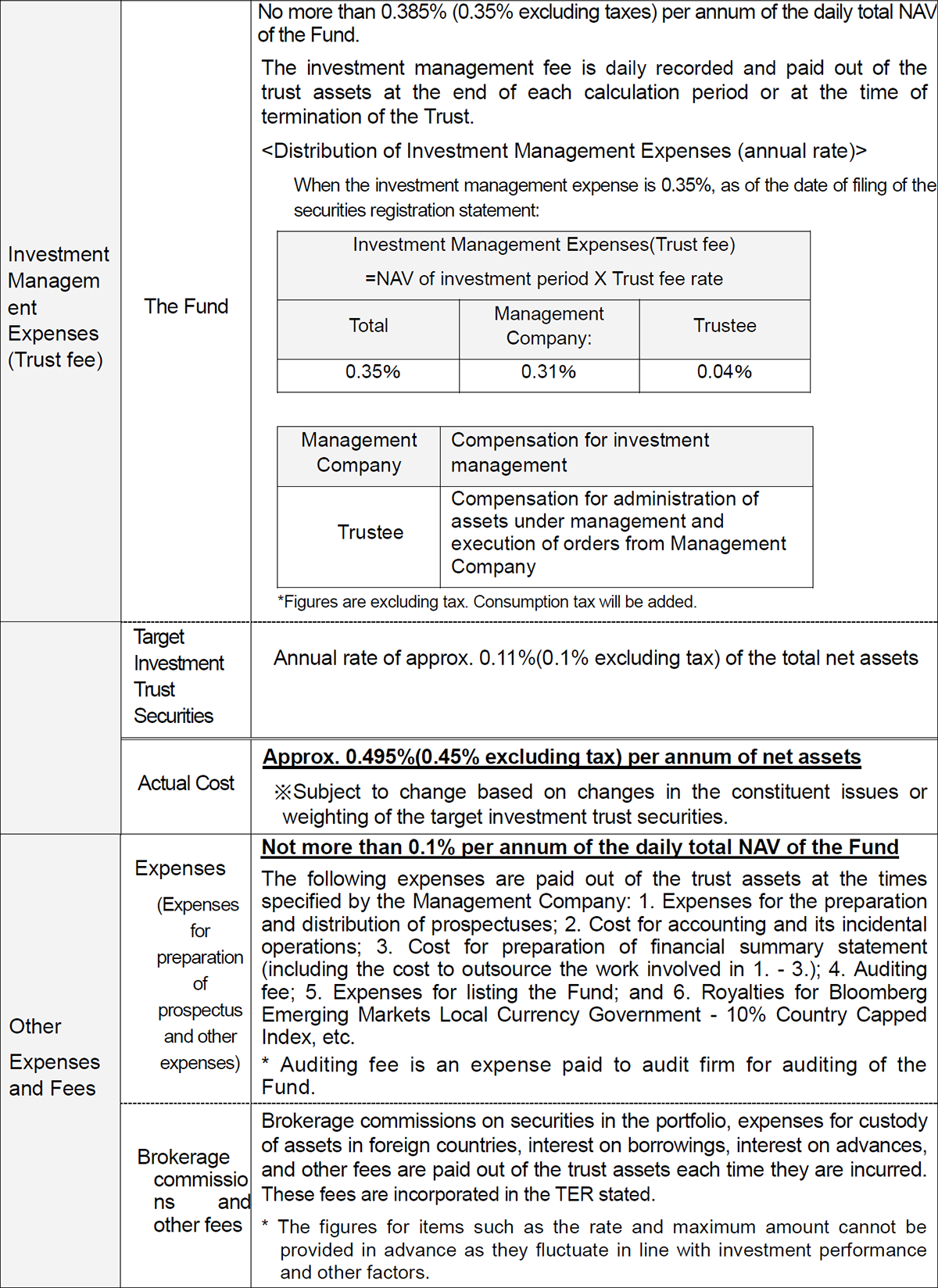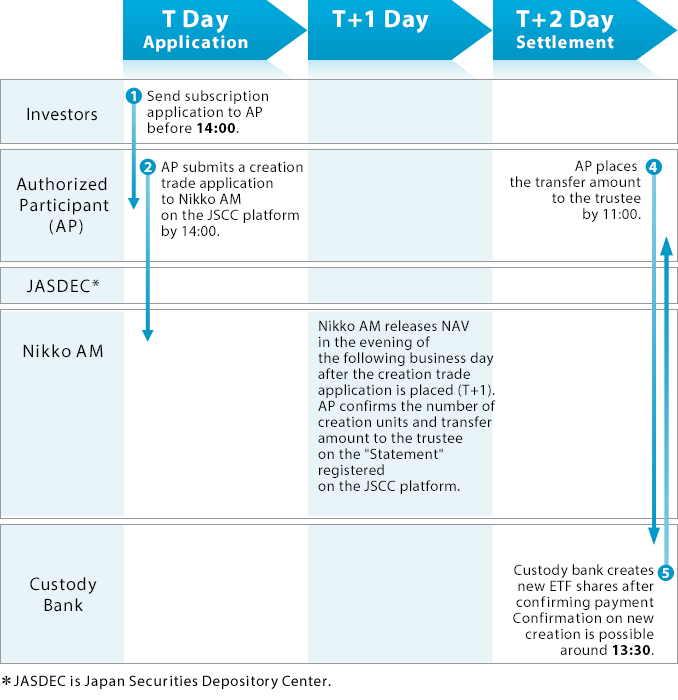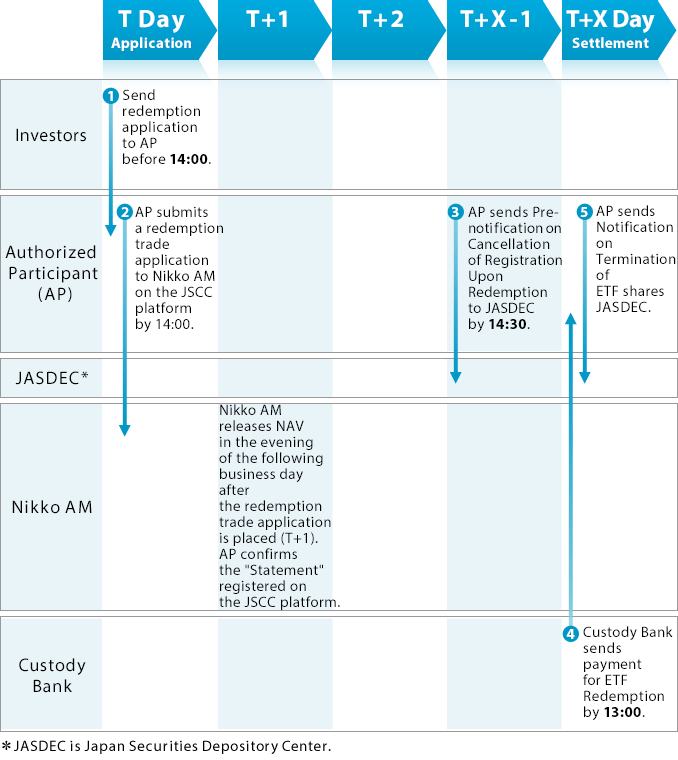On September 1, 2025, Nikko Asset Management Co., Ltd. will change its name to Amova Asset Management Co., Ltd.
This Fund seeks the net asset value per unit to track the performance of the yen-converted Bloomberg Emerging Markets Local Currency Government - 10% Country Capped Index by mainly investing in the separately stipulated investment trust securities.
Key information
| Name: | Listed Index Fund Emerging Bond | |
| Code: | 1566 |
Net Asset Value and Performance
Fund of Funds Structure
This Fund of Funds invests in securities held for investment trust.
- Emerging Markets Local Currency Government Index Fund (for Institutional Investors)
This fund seeks to achieve results that correlate to the movements of the yen-converted Bloomberg Emerging Markets Local Currency Government - 10% Country Capped Index by investing mainly in bonds denominated in the local currencies of emerging countries. - Money Account Mother Fund
This Fund seeks to achieve stable returns through stable management by investing in public and corporate bonds.

| Fund Name | Listed Index Fund Emerging Bond Open-end/Overseas/Bonds/ETF/Index type |
| Listed Exchange | Tokyo Stock Exchange |
| Issue Code | 1566 |
| Targeted Investments | Investment trust securities that seek to closely match the movement of the yen-converted Bloomberg Emerging Markets Local Currency Government - 10% Country Capped Index. |
| Date Listed | 30 March 2012 (launched on 30 January 2012) |
| Exchange Trading Unit | 1 unit |
| Taxation when selling out the fund | Conforms to taxation related to the sale of stocks. |
| Trust period | Unlimited |
| Computation Period | Every year, 11 Jan - 10 Mar, 11 Mar - 10 May, 11 May - 10 Jul, 11 Jul - 10 Sep, 11 Sep - 10 Nov, and 11 Nov - 11 Jan of following year. |
| Closing Date | Every year, the 10th day of odd-numbered month. |
| Dividends | All revenue from dividends arising from the trust assets will be, in principle, paid as dividends on the last day of the fiscal year after deducting expenses. *There is no guarantee on the payment or the amount of dividend. |
Fund Expenses
■Expenses to be borne directly by investors
| Subscription Fee | Independently set by Distributors *Please contact your Distributor for further information. *Subscription Fee is compensation for explanation and information providing about the Fund or investment environment, and is also including expense of clerical processing of the subscription. |
| Exchange Fee | Independently set by Distributors *Please contact your Distributor for further information. *Exchange Fee is compensation for clerical processing of the exchange. |
| Amount to be Retained in Trust Assets | An amount calculated by multiplying NAV at the time of a redemption by 0.3% (per unit) |
■Costs paid indirectly by the customer for the trust assets (paid from the fund)
| TER (Total Expense Ratio) |
0.65% (TER includes Trust Fee, management fee and other costs below) Please refer to the prospectus for details. |

The total amount of expenses of the Fund to be borne by investors varies according to holding length and investment status, and thus cannot be shown.
Investment Restrictions
|
Trustee Companies
|
Bloomberg Emerging Markets Local Currency Government - 10% Country Capped Index is the total return of local currency-denominated emerging market bonds weighted by the market capitalization. The index limits concentrated investments in just one country and expresses fluctuations in emerging country bonds and currencies.

Further Information
Japan Exchange Group (JPX)
Japan Exchange Group publishes summaries and lists of the ETFs, as well as other valuable information on their website.
S&P Global
- Listed ETF iNav
Please click this link to see the iNAV.
Bloomberg
Bloomberg Emerging Markets Local Currency Government - 10% Country Capped Index
【Index Constituents】
- Bloomberg Indices
Go to "Benchmark Indices", select "Indices used in UCITS Funds" and click "Constituents" of "Bloomberg EM Local Curr Gov 10% Country Capped TR Index Unhedged USD" in the list.
*Link to external sites.
Copyrights to "Bloomberg Emerging Markets Local Currency Government - 10% Country Capped Index"
“Bloomberg®” and Bloomberg Emerging Markets Local Currency Government - 10% Country Capped Index (hereinafter “The Index”) are service marks of Bloomberg Finance L.P. and its affiliates, including Bloomberg Index Services Limited (“BISL”), the administrator of the index (collectively, “Bloomberg”), and have been licensed for use for certain purposes by Nikko Asset Management.
Listed Index Fund Emerging Bond (hereinafter “The Fund”) is not sponsored, endorsed, sold or promoted by Bloomberg. Bloomberg does not make any representation or warranty, express or implied, to the owners of or counterparties to the Fund or any member of the public regarding the advisability of investing in securities generally or in the Fund particularly. The only relationship of Bloomberg to Nikko Asset Management is the licensing of certain trademarks, trade names and service marks and of the Index, which is determined, composed and calculated by BISL without regard to Nikko Asset Management or the Fund. Bloomberg has no obligation to take the needs of Nikko Asset Management or the owners of the Fund into consideration in determining, composing or calculating the Index. Bloomberg is not responsible for and has not participated in the determination of the timing of, prices at, or quantities of the Fund to be issued. Bloomberg shall not have any obligation or liability, including, without limitation, to the Fund customers, in connection with the administration, marketing or trading of the Fund.
BLOOMBERG DOES NOT GUARANTEE THE ACCURACY AND/OR THE COMPLETENESS OF THE INDEX OR ANY DATA RELATED THERETO AND SHALL HAVE NO LIABILITY FOR ANY ERRORS, OMISSIONS OR INTERRUPTIONS THEREIN. BLOOMBERG DOES NOT MAKE ANY WARRANTY, EXPRESS OR IMPLIED, AS TO RESULTS TO BE OBTAINED BY NIKKO ASSET MANAGEMENT, OWNERS OF THE FUND OR ANY OTHER PERSON OR ENTITY FROM THE USE OF THE INDEX OR ANY DATA RELATED THERETO. BLOOMBERG DOES NOT MAKE ANY EXPRESS OR IMPLIED WARRANTIES AND EXPRESSLY DISCLAIMS ALL WARRANTIES OF MERCHANTABILITY OR FITNESS FOR A PARTICULAR PURPOSE OR USE WITH RESPECT TO THE INDEX OR ANY DATA RELATED THERETO. WITHOUT LIMITING ANY OF THE FOREGOING, TO THE MAXIMUM EXTENT ALLOWED BY LAW, BLOOMBERG, ITS LICENSORS, AND ITS AND THEIR RESPECTIVE EMPLOYEES, CONTRACTORS, AGENTS, SUPPLIERS, AND VENDORS SHALL HAVE NO LIABILITY OR RESPONSIBILITY WHATSOEVER FOR ANY INJURY OR DAMAGES—WHETHER DIRECT, INDIRECT, CONSEQUENTIAL, INCIDENTAL, PUNITIVE OR OTHERWISE—ARISING IN CONNECTION WITH THE FUND OR THE INDEX OR ANY DATA OR VALUES RELATING THERETO—WHETHER ARISING FROM THEIR NEGLIGENCE OR OTHERWISE, EVEN IF NOTIFIED OF THE POSSIBILITY THEREOF.
- 21 Feb 2025 — Earnings Report for Fiscal Year ended Jan 2025
- 23 Aug 2024 — Earnings Report for Fiscal Year ended Jul 2024
- 22 Feb 2024 — Earnings Report for Fiscal Year ended Jan 2024
- 23 Aug 2023 — Earnings Report for Fiscal Year ended Jul 2023
- 22 Feb 2023 — Earnings Report for Fiscal Year ended Jan 2023
- 23 Aug 2022 — Earnings Report for Fiscal Year ended Jul 2022
- 22 Feb 2022 — Earnings Report for Fiscal Year ended Jan 2022
- 23 Aug 2021 — Earnings Report for Fiscal Year ended Jul 2021
- 22 Feb 2021 — Earnings Report for Fiscal Year ended Jan 2021
- 21 Aug 2020 — Earnings Report for Fiscal Year ended Jul 2020 (11 Jan 2020 – 10 Jul 2020)
- 21 Feb 2020 — Earnings Report for Fiscal Year ended Jan 2020 (11 Jul 2019 - 10 Jan 2020)
- 23 Aug 2019 — Earnings Report for Fiscal Year ended Jul 2019 (11 Jan 2019 – 10 Jul 2019)
- 22 Feb 2019 — Earnings Report for Fiscal Year ended Jan 2019 (11 Jul 2018 - 10 Jan 2019)
- 23 Aug 2018 — Earnings Report for Fiscal Year ended Jul 2018 (11 Jan 2018 – 10 Jul 2018)
- 23 Feb 2018 — Earnings Report for Fiscal Year ended Jan 2018 (11 Jul 2017 - 10 Jan 2018)
- 22 Aug 2017 — Earnings Report for Fiscal Year ended Jul 2017 (11 Jan 2017 - 10 Jul 2017)
- 23 Feb 2017 — Earnings Report for Fiscal Year ended Jan 2017 (11 July 2016 - 10 Jan 2017)
- 23 Aug 2016 — Earnings Report for Fiscal Year ended Jul 2016 (11 Jan 2016 - 10 Jul 2016)
- 23 Feb 2016 — Earnings Report for Fiscal Year ended Jan 2015 (11 Jul 2015 - 10 Jan 2016)
- 21 Aug 2015 — Earnings Report for Fiscal Year ended Jul 2015 (11 Jan 2015 - 10 Jul 2015)
- 23 Feb 2015 — Earnings Report for Fiscal Year ended Jan 2015 (11 Jul 2014 - 10 Jan 2015)
- 22 Aug 2014 — Earnings Report for Fiscal Year ended Jul 2014 (11 Jan 2014 - 10 Jul 2014)
- 21 Feb 2014 — Earnings Report for Fiscal Year ended Jan 2014 (11 Jul 2013 - 10 Jan 2014)
- 23 Aug 2013 — Earnings Report for Fiscal Year ended Jul 2013 (11 Jan 2013 - 10 Jul 2013)
- 22 Feb 2013 — Earnings Report for Fiscal Year ended Jan 2013 (11 Jul 2012 - 10 Jan 2013)
- 17 Aug 2012 — Earnings Report for Fiscal Year ended Jul 2012 (30 Jan 2012 - 10 Jul 2012)
This Fund can be applied for as a cash creation and a cash redemption at Authorised Participants in addition to the Tokyo Stock Exchange. When applying as a direct addition and exchange, please keep in mind that we cannot accept your application on the following dates:
Authorized Participants
- SMBC Nikko Securities Inc.
- Citigroup Global Markets Japan Inc.
- ABN AMRO Clearing Tokyo Co., Ltd.
- Barclays Securities Japan Limited
- BNP Paribas Securities (Japan) Limited
- BofA Securities Japan Co., Ltd.
- Daiwa Securities Co. Ltd.
- Goldman Sachs Japan Co.,Ltd.
- Mitsubishi UFJ Morgan Stanley Securities Co., Ltd.
- Mizuho Securities Co., Ltd.
- Nomura Securities Co., Ltd.
Daily Creation and redemption are based on ETF's NAV calculated in early evening. Confirm non-tradable days by referring to trading calendar on our official homepage. Basket for creation is continually-updated on our official homepage.
Basically sell/buy at last price of T day's market while FX rate is TTM of one business day after the application (10am on T+1)
The flow chart below is showing the creation/redemption process for Nikko AM ETFs. Please note that transactions cannot be processed for days on which applications are not accepted.
Creation Flow for Cash Creation/Redemption Type ETFs

Redemption Flow for Cash Creation/Redemption Type ETFs

Investors are not guaranteed the investment principal that they commit. Investors may incur a loss and the value of their investment principal may fall below par as the result of a decline in market price or NAV. All profits and losses arising from investments in the Fund belong to the investors (beneficiaries). This fund is different from saving deposit.
The Fund invests primarily in bonds. The NAV of the Fund may fall and you may suffer a loss for reasons such as a drop in the price of bonds or deterioration in financial conditions and business performance of an issuer of stocks. Investors may also incur losses due to exchange rate fluctuations when investing in assets denominated in foreign currencies.
Major risks are as follows:
1. Price Fluctuation Risk
Corporate and government bonds generally have a price fluctuation risk arising from changes in interest rates. Generally, their prices go down when interest rates rise, causing the NAV of the funds to fall. The degree of price fluctuation varies depending on the remaining time to maturity and the terms of issue in question.
The price of bonds in emerging countries to be targeted tends to be more volatile as compared with bonds in advanced countries. Consequently, price fluctuation may have significant impact on the NAV.
2. Liquidity Risk
Where the market size or trading volume is small, buying and selling prices for securities may be largely affected. This results in the risk that securities cannot be traded at the expected prices, sold at the appraised prices, or that trading volume is limited regardless of prices. This creates the risk of unexpected losses.
Bonds of emerging countries tend to be more susceptible to liquidity risk due to their smaller market size and trading volume when compared to those of advanced countries.
3. Credit Risk
If a default has occurred or is expected to occur, for issuers of public and corporate bonds or short-term financial assets, the price of such public and corporate bonds or short-term financial assets decline (the value could even fall to zero). This results in a decline of the Fund's NAV. In addition, if default in fact occurs, there is a high possibility of being unable to collect investment funds.
While the return on emerging countries' bonds may be higher than those of advanced countries, they also have more price volatility and higher risk of default.
4. Currency Fluctuation Risk
For foreign-currency-denominated assets, in general, if the yen is stronger than the currencies of such assets, the Fund?fs NAV will decline.
In general, currencies of emerging countries may exhibit higher volatility than those of developed countries.
5. Country Risk
There is a risk that the Fund could incur material losses as a result of unexpected market fluctuation or flow of funds, including the occurrence of any state of emergencies in a target country (such as a financial crisis, government default due to financial reasons, significant policy change, introduction of new regulations including asset freezes, natural disasters, coups, significant change of regime or war). In such cases, the fund may not be managed as planned.
Emerging countries in general tend to be insufficient or slow in information disclosure or in the dispatch of accurate information, when compared to advanced countries.
6. Security-lending Risk
Lending securities is accompanied by counterparty risks, which are the risks of default or cancellation of lending agreements as a result of bankruptcy, etc. by the counterparties. As a result, there is a risk that the Fund will suffer unanticipated losses. Following the default or cancellation of a lending agreement, when liquidation procedures are implemented by using the collateral that is set aside in the lending agreement, the procurement cost of buying back the securities can surpass the collateral value, due to price fluctuations in the market. In such a case, the fund would need to make up for the price difference, and therefore incur a loss.
Main Factors Contributing to the Discrepancies between Yen-converted Bloomberg Emerging Markets Local Currency Government - 10% Country Capped Index and NAV
This Fund seeks to ensure that its NAV has the same volatility as the yen-converted Bloomberg Emerging Markets Local Currency Government - 10% Country Capped Index; however, we cannot always guarantee that the Fund will have the same volatility as the Index due to the following factors attributable to this Fund and to the investment trust securities invested in by this Fund:
- Lag in the timing of fund inflows and to the purchase of investment trust securities.
- Where the portfolio is adjusted through investment in issues other than the constituent issues of the Bloomberg Emerging Markets Local Currency Government - 10% Country Capped Index or through changes in the constituent issues or weighting of Bloomberg Emerging Markets Local Currency Government - 10% Country Capped Index, the trading of individual issues may be affected by market impact or the Fund may bear costs such as management fees, brokerage fees and auditing fees.
- Securities lending fees from lending securities; and
- Where derivative transactions such as futures are conducted, discrepancies in price movements between such transactions and part or all of the constituent issues of the Bloomberg Emerging Markets Local Currency Government - 10% Country Capped Index.
Discrepancies between the market prices at which stocks are traded on the exchange and the NAV
This Fund is listed on and will be publicly traded on the Tokyo Stock Exchange, however, the market price of the units will depend mainly on the demand for the Fund, its investment performance, and how attractive it is to investors in comparison to alternative investments, etc. We cannot predict whether this fund will be traded as a market value below or above its NAV.
- The prices of securities targeted for investment of this Fund will fluctuate under the influence of the aforementioned risks. Therefore, please note that this Fund itself has these risks as well.
- The factors that contribute to fluctuations in the NAV are not limited to those listed above.
- Securities lending fees from lending securities; and
Additional Considerations
- These distribution materials were prepared for the purpose of providing information on the Listed Index Fund Emerging Bond offered by Nikko Asset Management and increasing investors' understanding of this Fund.
- The provisions stipulated in Article 37-6 of the Financial Instruments and Exchange Act ("cooling-off period") are not applicable to Fund transactions.
- This Fund differs from deposits or insurance policies in that it is not protected by the Deposit Insurance Corporation of Japan or the Policyholders Protection Corporation of Japan. Furthermore, units purchased from registered financial institutions, such as banks, are exempted from compensation by the Japan Investor Protection Fund.
- When the Fund faces big redemption causing short term cash requirement or sudden change in the main trading market condition, there can be temporal decline in the liquidity of holding assets, resulting in the risks that Fund unable to trade securities at the expected market prices or appraised prices, or encounters limitation in trading volume. This may result in the negative influence on NAV, suspension of redemption applications, or delay in making payment of redemption.
- When applying to invest in the Fund, please make the decision to invest carefully after taking the time to read the delivered pre-agreement document and other relevant materials in detail.


